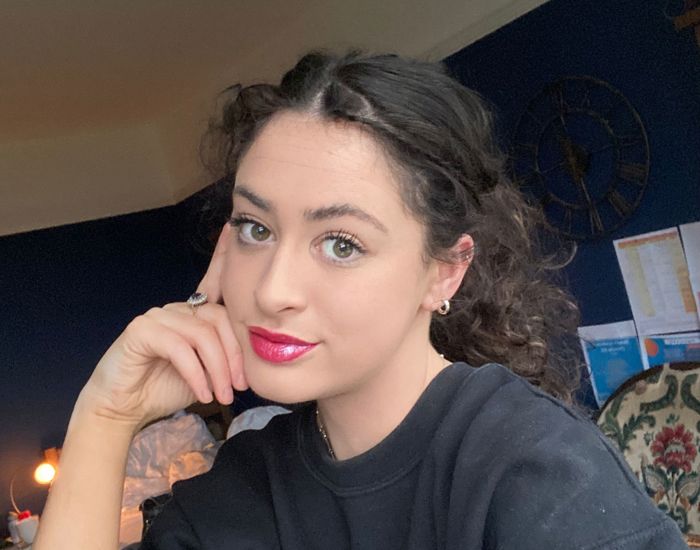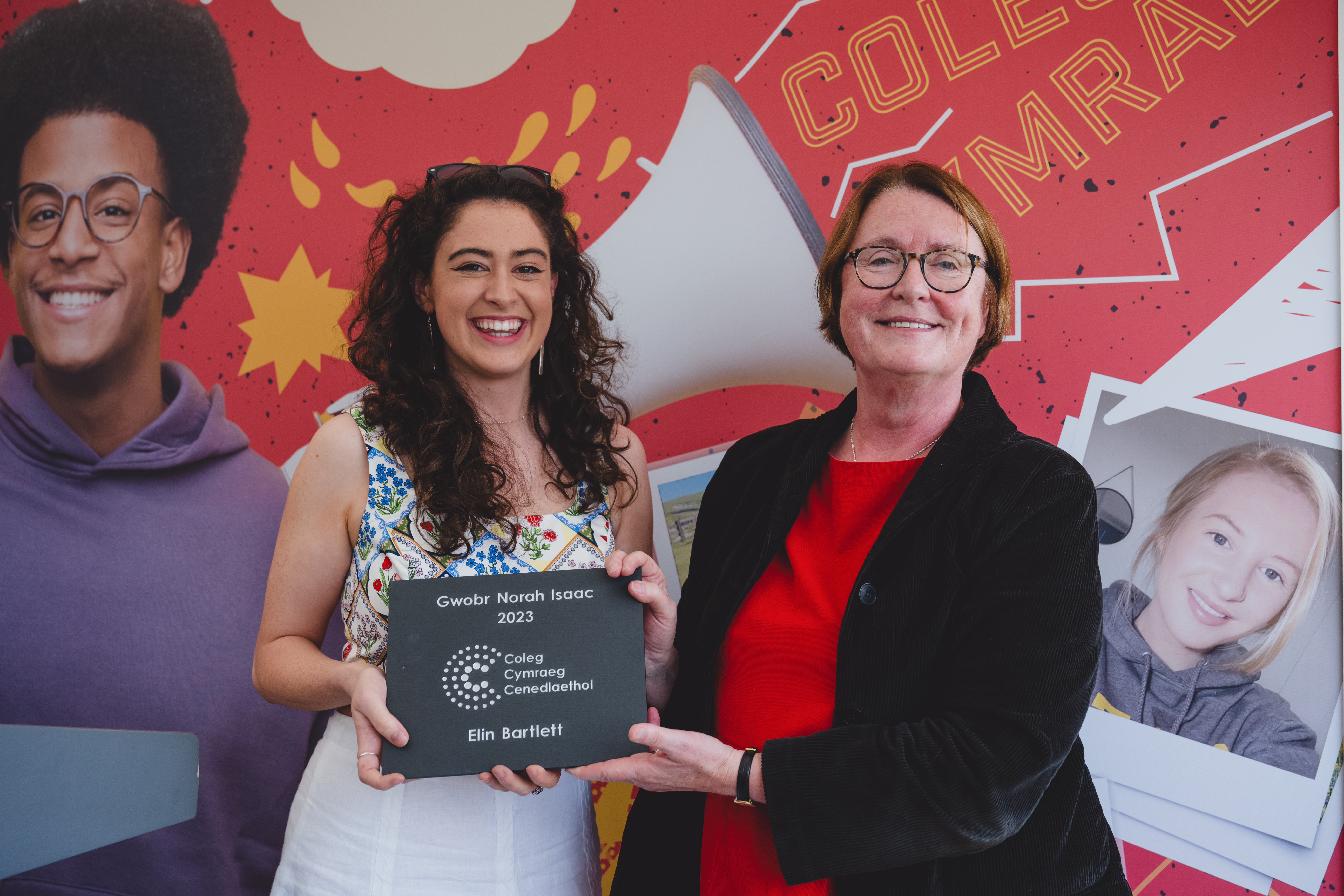Choosing to study part of her Medicine course through the medium of Welsh was very important to Elin Bartlett, a fourth year student at Cardiff University.
Since moving from her family home in Wrexham to Cardiff to start her course, Elin has taken advantage of all the opportunities the Coleg Cymraeg has offered her. As well as having the opportunity to study a third of her medicine course in Welsh and receiving an incentive scholarship from the Coleg to do so, Elin has spent two years as an ambassador for the Coleg where she had the opportunity to share her passion for the Welsh language in the healthcare sector and raise awareness about women's health which interests her greatly.
She recently developed her new podcast, ‘Paid Ymddiheuro’, with fellow student Celyn Jones-Hughes which gives students a platform to discuss topics relating to women's health through the medium of Welsh, from periods to the menopause, in a safe environment. Elin and Celyn aim to remove the stigma associated with some of these subjects.
Good communication skills in the Welsh language are very important to Elin, and recently on at the National Eisteddfod, she won the Coleg Cymraeg Cenedlaethol's Norah Isaac Award for receiving the best result from an undergraduate student in the Coleg's Welsh Language Skills Certificate assessment. We spoke to Elin as she looks forward to starting another year at Cardiff University, to get to know her better...
1. How would you describe your upbringing?
I grew up in Ruabon, a village outside Wrexham in North East Wales. I attended I.D. Hooson School in Rhosllanerchrugog before attending Ysgol Morgan Llwyd. Fortunately, I really enjoyed school- maybe because of the social aspect of it! I was an extremely curious child and always wanted to know 'why?' about everything that was going on around me. Being an only child, I have a close relationship with my parents. Between the two of them scientific, historical and creative interests surrounded me every day and so I had no choice but to learn something new every day!
2. How did your interest in medicine arise?
My interest in medicine probably started from a very young age. I could never stop talking, and not much has changed now to tell the truth! I like getting to know new people and gaining insight into different lives, cultures and personalities. Communicating and listening to patients’ stories is the root of healthcare and medicine so that was a good start! Combining my passion for caring for people with my interest in science and health conditions was perfect for medicine. Certainly by high school I knew I wanted to be a doctor!
3. What do you like about studying medicine?
I like problem solving, therefore building a story with your patients by listening to their story, knowing their symptoms and coming to a diagnosis is like being a detective! There is nothing more valuable than being able to diagnose a person which then leads to starting treatment that improves their quality of life.
4. Why did you decide to study part of the course through the medium of Welsh?
It was always important for me to be able to study part of my course through the medium of Welsh as all patients have the right to receive their healthcare in the Welsh language. Health conditions are are highly personal and sometimes talking about them is easier if you can discuss them in the most comfortable language for you.
There is a “gender health gap” in the United Kingdom. I created the podcast, 'Paid Ymddiheuro' to open up the conversation about women's health here in Wales.
5. Why is raising awareness for women's health in particular, so important?
Women's health is a specific part of medicine that I'm very passionate about. Historically, conditions affecting women have been ignored. A "gender health gap" exists in the United Kingdom. According to research by University College London in 2016, women with dementia received worse medical treatment than men with the same condition. In addition, treatment of conditions that directly affect women such as endometriosis and menopause still need to be cured. Dr Janine Austin Clayton's words: "we literally know less about every aspect of female biology compared to male biology" explains it perfectly! I started the podcast, Don't Apologise, with Celyn Jones-Hughes to start opening up the discussion about women's health here in Wales. The first series is now available on all streaming platforms and has been an amazing experience!
6. What or who inspires you?
Without a doubt, I must say that it is my parents who inspire me. They are both extremely hardworking, kind, selfless and resilient. They have taught me the importance of listening to people and using the skills I have to help others. We have always been good at communicating with each other as a family and sharing each other's burden when challenges arise. In addition, they have taught me that no one is perfect and that everyone makes mistakes, but it is how you respond to them that shapes you as a person. So, if I live my life in a way they could be proud of, I'm happy! (Hopefully I'll be in the good books now!)
7. What do you like to do to relax?
I love keeping busy, but relaxing is also extremely important to me as I am very guilty of doing too much sometimes! I love music and I’m a member of the Aelwyd y Waun Ddyfal choir and the new TafLais choir in Cardiff. Spending time with friends is very important to me, so any excuse to go for lunch, coffee or for a walk, I'll take it in a blink! When I am anxious about anything, I have to go to the beach and ideally, swim in the sea, even in winter!
8. Do you have any advice for a young person wanting to study medicine through the medium of Welsh?
In my opinion, the most important thing about medicine is you have to love spending time with people. You must be able to listen to them, discuss and work with them, so the ability to communicate effectively in both Welsh and English is essential. Thanks to the Coleg Cymraeg and the university, Welsh provision is now available on the medicine course in Cardiff so I would definitely encourage Welsh speakers to make the most of that. The second thing is, be resilient. If you could be open to making mistakes and learn from them, be strong and be able to adapt when things go wrong, you would be absolutely brilliant! Go for it as it's the most fulfilling career you can have.

